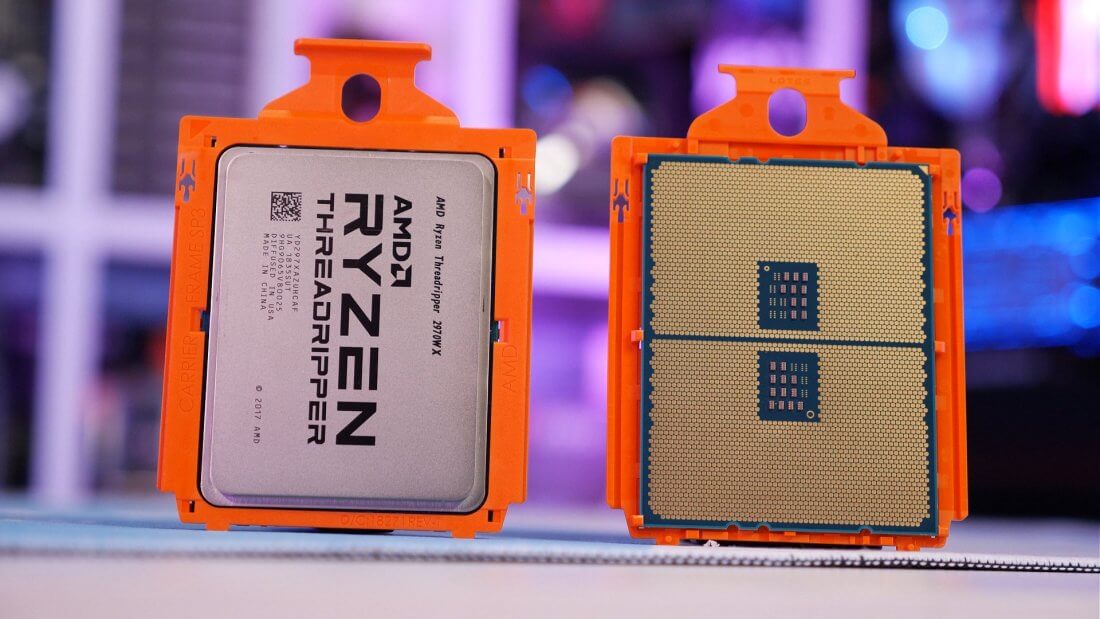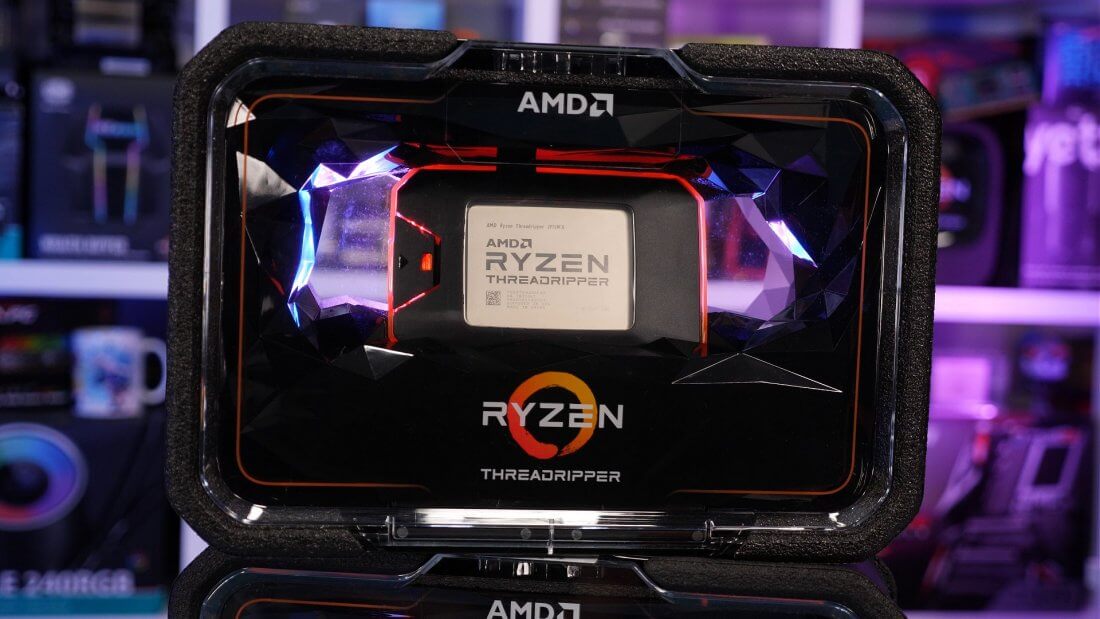AMD is launching new 12 and 24-core 2nd-gen Threadripper parts known as the 2920X and 2970WX. Almost three months have passed since we first checked out the flagship TR 2950X and 2990WX, the 16 and 32-core models. Still AMD did warn us at the time at that rest of the 2nd-gen Threadripper lineup wouldn't arrive until October, and here we are at the tail end of the month.
Before we get to the testing and benchmark results, here's a quick refresher covering the design and specs...
There are two models in the WX series, where the 'W' signifies that this is a workstation series. The workstation 2990WX and 2970WX models are configured very differently to the 2950X and 2920X processors. Whereas the 12 and 16-core processors pack two Zeppelin dies, the 24-core and 32-core models feature four.
Typically such a configuration would have 4 dual-channel memory controllers for 8-channels, this however isn't possible on the X399 platform, limiting these core heavy parts to quad-channel memory.
Although there are two more Zeppelin dies, the additional dies are compte dies, in AMD's words. This means they have no local PCIe or DRAM access, for that they must travel via the Infinity Fabric to the IO dies. As there are twice as many dies, the Infinity Fabric bandwidth is also halved, so now the throughput between dies is just 25Gbps, assuming you're using DDR4-3200 memory.
Because of this design that sees two of the dies without direct access to the DRAM, it means that unlike the 2920X and 2950X, the 2970WX and 2990WX use NUMA exclusively. AMD claimed that this quad-NUMA configuration allowed them to create the world's first 32-core consumer processor and just as important it has allowed them to do it while maintaining backwards compatibility with existing TR4 products.
This shift on how the CPU operates internally caused some compatibility issues, or rather performance issues with games and some applications, namely Windows 10. Windows 10's scheduler has been proven to be very inefficient at managing these core heavy CPUs and we found significantly better performance when testing the same applications with a Linux based operating system.
Unfortunately this remains a huge problem for the 2990WX – and we suspect the 2970WX – and while Microsoft hasn't done anything to improve the situation yet, AMD has. The latest version of the Ryzen Master software which will be available for download today, introduces a Dynamic Local Mode and crucially you don't need to reset the system in order to enable it.
In AMD's words, Dynamic Local Mode automatically migrates the system's most demanding application threads onto the Threadripper 2990WX and 2970WX CPU cores with local memory access. In other words: applications and games that prefer local DRAM access will automatically receive it, but applications that scale to many cores will still be free to do so.
| Price | Cores / Threads | Base / Turbo Clock (MHz) | L2 Cache (MB) | L3 Cache (MB) | TDP | |
| TR 2990WX | $1720 | 32/64 | 3.0 / 4.2 | 16 | 64 | 250 W |
| TR 2970WX | $1299 | 24/48 | 12 | 64 | ||
| TR 2950X | $900 | 16/32 | 3.5 / 4.4 | 8 | 32 | 180 W |
| TR 1950X | $680 | 16/32 | 3.4 / 4.2 | 8 | 32 | |
| TR 2920X | $649 | 12/24 | 3.5 / 4.3 | 6 | 32 | |
| TR 1920X | $390 | 12/24 | 3.5 / 4.2 | 6 | 32 |
It's great to see AMD working to improve the user experience with these high-end desktop processors, but ultimately the biggest improvements will come when Microsoft updates the Windows scheduler. For now the 2990WX and 2970WX will be safer purchases for those using a Linux based operating system, but for certain tasks such as rendering they're still beasts in Windows.
Spec-wise the 12-core part is virtually identical to the 16-core part, minus the obvious reduction in core count and the same is true when comparing the 24-core and 32-core parts.
For testing all systems were configured with DDR4-3200 CL14 memory. The quad-channel platforms received 32GB and the dual-channel systems 16GB. The Threadripper CPUs were benchmarked with the Enermax Liqtech 360 TR4 while the Skylake-X CPUs used a 360mm open loop setup, this won't skew stock performance in Intel favor. The Coffee Lake and 2nd-gen Ryzen parts were both tested with the Corsair H115i Pro and finally the graphics card of choice is Gigabyte's RTX 2080 Ti Gaming OC.
Benchmarks
As expected the 2920X roughly matches the 1920X and 2950X when it comes to sustained memory bandwidth performance. The 2970WX though, it surprised with a throughput of 67 GB/s which is a few Gigabytes per second faster than the 2990WX and 6% more memory bandwidth than a typical Threadripper CPU.

Cinebench single thread performance is right where we expected it to be, the 2920X scored 178 pts placing it on par with the 2950X while the 2970X matched the 2990WX and older 1920X.
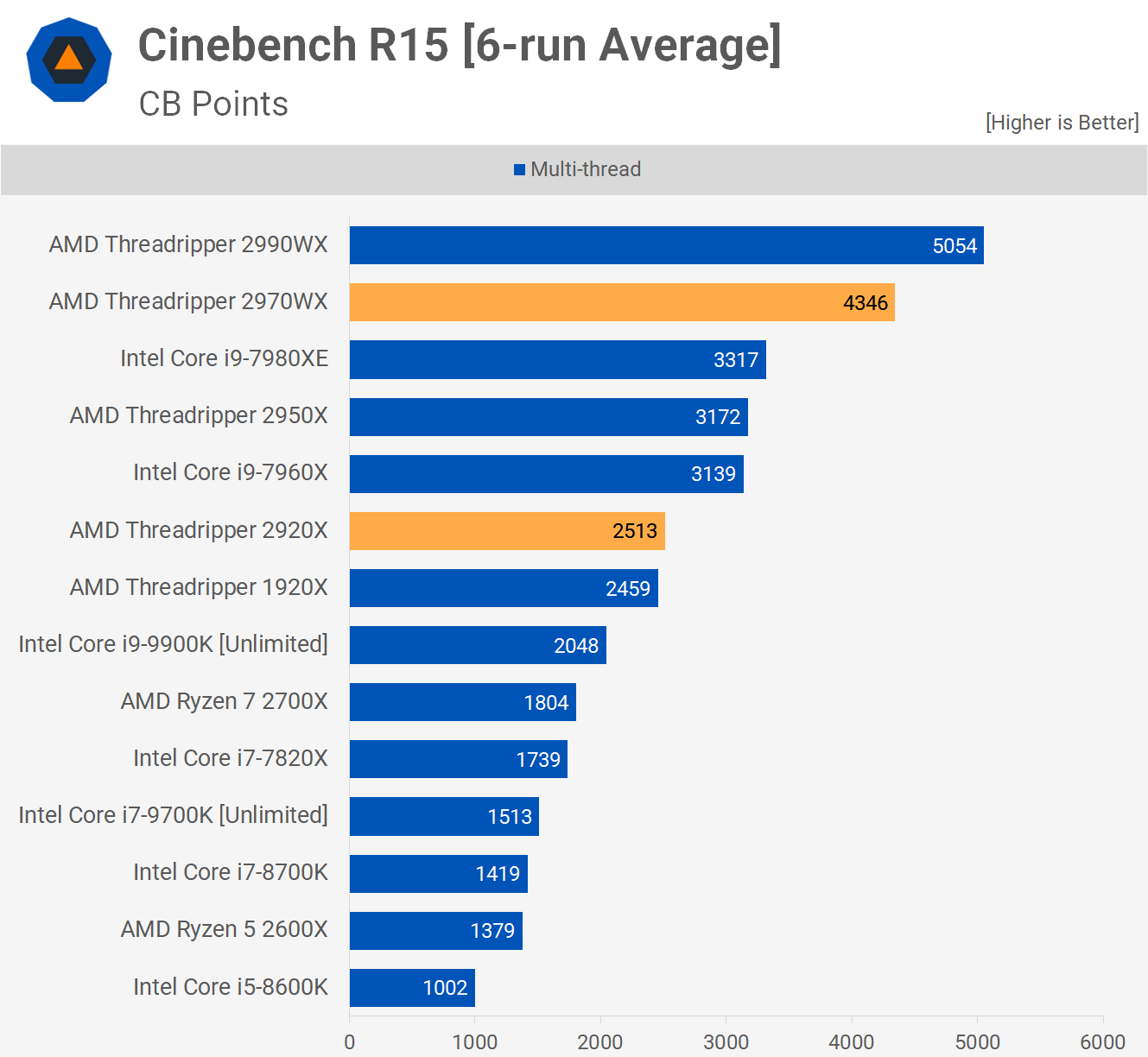
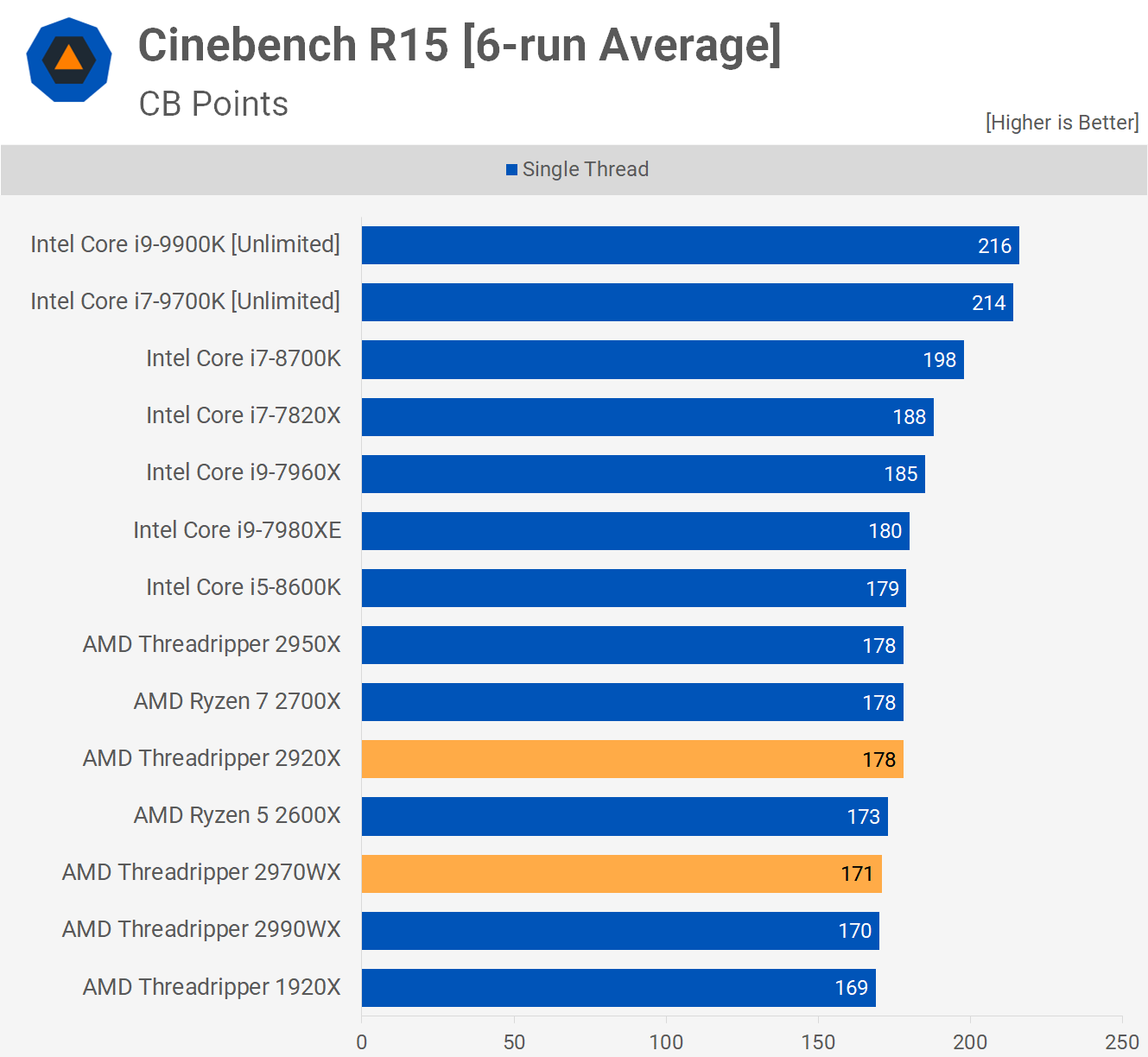
Of course, it's the multi-threaded performance that's of most importance for these core heavy CPUs and here we see the 2970WX cleaning up, coming second only to it's 32-core version. A score of roughly 4300 pts made it just over 30% faster than Intel Core i9-7980XE. Meanwhile the 2920X just edged ahead of the 1920X making it just 25% slower than Intel 16-core 7960X.

Again the 2920X offers a small performance improvement over the 1920X, this time in our Blender test. The 2970WX is also a big step up from the 7980XE, as it was again a little over 30% faster. It was also 36% faster than the Threadripper 2950X, taking just 9.5 seconds and that mean it was also just 13% slower than the 32-core 2990WX.

The 2970WX was still faster than the 7980XE in Corona though unlike previous tests where it won by a 30% margin or greater, here it's just 8% faster. The 2920X was again a few percent faster than the 1920X and 9% faster than the 9900K running without a TDP limit in place.

The last rendering benchmark we're looking at is V-Ray and again the 2970WX makes short work of the more expensive 18-core processor from Intel, here it beat the 7980XE by a 22% margin. It was also just 13% slower than the 2990WX, so a solid result for the new 24-core CPU. The 2920X also does well despite offering just 5% more performance than the 1920X, here it was 13% faster than the Core i9-9900K.
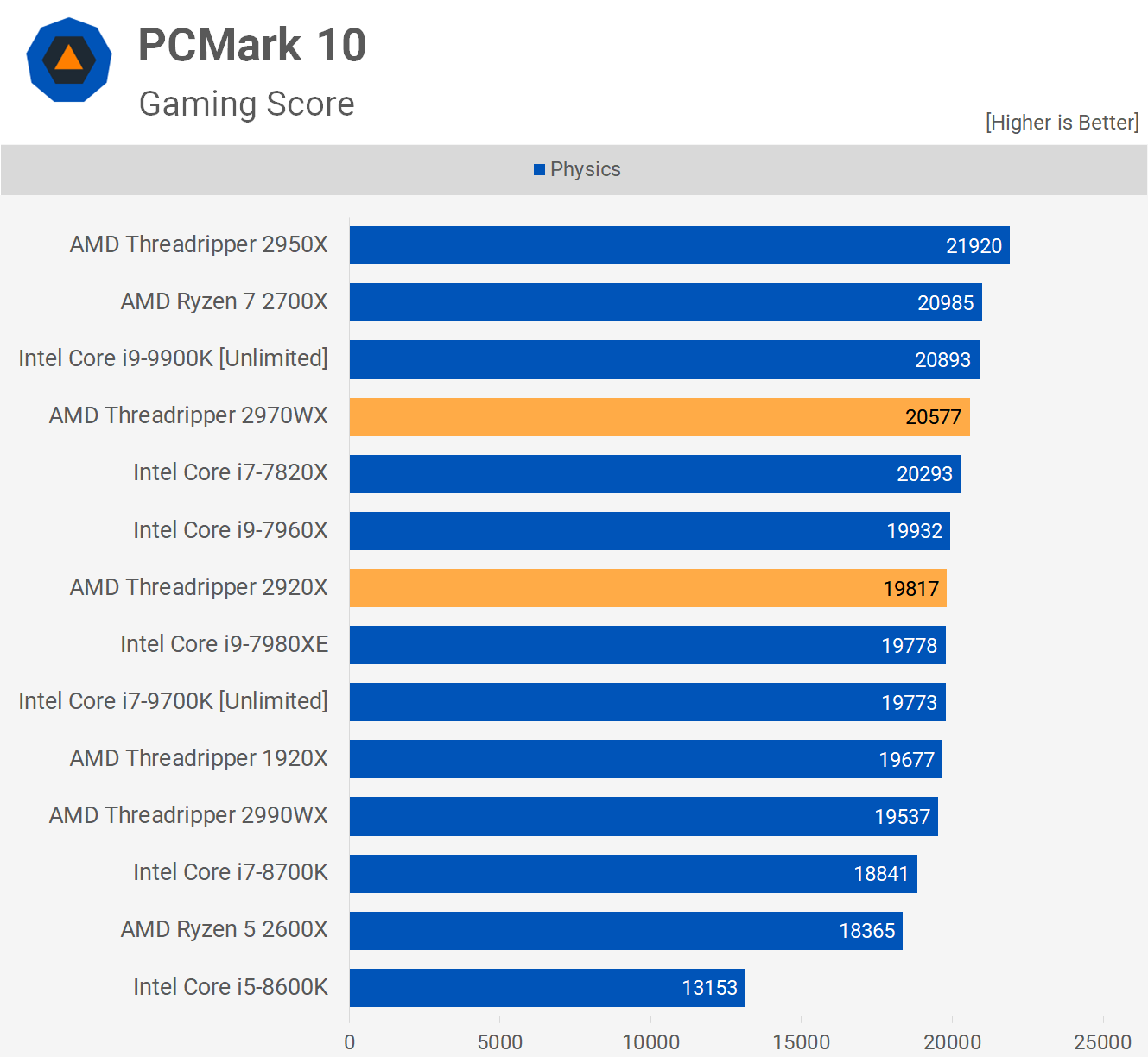
The PCMark 10 gaming benchmark shows the 2970WX doing much better than the 2990WX though the 2950X is still by far the best Threadripper CPU in this test, and well the best CPU overall.

